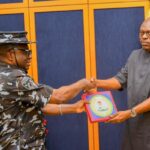As Nigeria joins the rest of Africa in commemorating the Day of the African Child, the United Nations Children’s Fund (UNICEF) has called on the Federal Government and other stakeholders to seize the opportunities presented by digitalization for the learning and development of Nigerian children.
The theme for this year’s Day of the African Child is “The Rights of the Child in the digital environment.”
“Digital technology provides us with a platform to innovate and seek ways for inclusive quality education for all children,” said Cristian Munduate, UNICEF Representative in Nigeria.
“I urge all stakeholders in the education sector to adopt and scale up the Nigeria Learning Passport to reduce the number of children in Nigeria who are not receiving any education. It will also improve foundational literacy and numeracy,” she noted.
UNICEF Communication Specialist, Geoffrey Njoku, stated in a Friday statement that this celebration offers the UN agency an opportunity to advocate for digital inclusiveness for all children—the right of every child to participate in the digital space.
He emphasized that by realizing this right, “we are equally offered the opportunity to exploit the digital space for learning and development.”
Njoku acknowledged that the education sector in Nigeria faces numerous challenges, including limited access to quality learning. He cited low domestic spending on education, which results in insufficient school infrastructure and qualified teachers, high levels of poverty, and social norms that are not supportive of education, especially for girls, as inhibiting factors.
He further pointed out that these challenges are exacerbated by attacks on schools and the abduction of learners, which have made parents fearful of sending their children to school.
According to the statement, “The disruption to education caused by school attacks has resulted in millions of children significantly missing out on learning opportunities they would have acquired if they had been in the classroom. More than 10 million children are not enrolled in primary school. For those in school, the quality of learning is poor, with 75 per cent of primary school-age pupils unable to read with understanding or solve simple math problems.”
In order to bridge the gap in access to quality learning opportunities, UNICEF and the Federal Ministry of Education launched the Nigeria Learning Passport (NLP) last year. The NLP is an online, mobile, and offline digital learning platform powered by Microsoft. It provides continuous access to 15,000 curriculum-aligned learning and training materials in local languages for learners, teachers, and parents.
The NLP is highly flexible and adaptable, allowing states, schools, teachers, parents, and other users to easily and quickly customize it as their learning management system in schools, for homework support, and to ensure continuity of learning during school closures in emergency situations.
Furthermore, the NLP is inclusive enough to bridge the digital divide, as it includes an offline module that allows for deployment in rural and hard-to-reach environments with no internet access.
To support the implementation of the NLP, UNICEF has provided 780 schools in hard-to-reach areas and rural schools with 13,500 tablets, 1,000 smart rechargeable projectors, and 780 Airtel internet routers. Connectivity has been enabled for 186 schools through a partnership with IHS towers, and data costs have been removed through the whitelisting of the NLP on an Airtel SIM card.
Since its inception, the Nigeria Learning Passport has provided access to quality teaching and learning resources to 280,000 learners, teachers, parents, and young people. A user satisfaction survey involving 5,002 respondents revealed that 92 per cent of them mentioned using the platform more than once, with 51 per cent using it daily, and 63 per cent accessing it from home.
Furthermore, 95 per cent of the respondents mentioned that the content meets their needs, 76 per cent reported learning new things, and 91 per cent (9 in 10 people) stated that the NLP supported their education.
Quoting a student from the survey, one stated, “NLP helped me gain a lot of understanding about topics I don’t understand in school.” A parent said, “I can prepare my kids ahead of their lessons and also follow up on what they are being taught.” A teacher testified, “NLP improves my knowledge and teaching skills.”
YOU SHOULD NOT MISS THESE HEADLINES FROM NIGERIAN TRIBUNE
WEEK BRIEF: Emefiele’s suspension, arrest and Nigeria Air’s revelations top news
The story of the suspension of the Governor of the Central Bank of Nigeria (CBN), Godwin Emefiele by President Bola Tinubu broke the internet on…
95% of Nigerian male celebrities, including myself, ‘do both men and women’ — Actor Uche Maduagwu
Controversial Nollywood actor Uche Maduagwu has claimed that no fewer than 95% of both married and single celebrities, including…
Real Reason Tinubu suspended Emefiele — FG
President Bola Tinubu, on Friday, ordered immediate suspension of Mr Godwin Emefiele as…
10 points from President Tinubu’s Democracy Day broadcast
In commemoration of this year’s Democracy Day celebration, President Bola Tinubu made his…
[PHOTOS] Hilda Baci: Lady begins 120 hours cook-a-thon to break Guinness Records
DURING his inauguration speech, President Bola Ahmed Tinubu announced that the era of…
SERIE A: Victor Osimhen becomes first African to win Capocannoniere award
A chef identified as Damilola Adeparusi has begun a 120-hour cooking marathon in Oye Local Government Area in…






